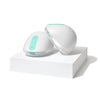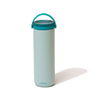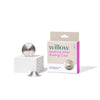Useful information and resources for pumping moms in the event of a natural disaster or emergency.
To the communities affected by the fires in Southern California: we are so sorry. Whether you’ve evacuated or are affected by poor air quality and power outages, we’ve put together some tips for pumping moms on what to put in your go-bag, your rights as a parent, how to care for breast milk during an outage, and other helpful resources should you need them.
What to Pack in Your Pumping Go-Bag
To ensure you’re ready to go, it’s wise to keep these items in your pumping bag at all times.
-
Fully charged portable charger
-
Breastmilk storage bags
-
Bottles and requisite parts
-
Manual pump
Know Your Rights
In an emergency, you may need to take time off of work, whether you’ve evacuated your home or because your children’s schools are closed. While laws differ from state to state, California State Law Senate Bill 1044 allows employees to take time off of work during a natural disaster if they feel their safety is at risk. Also know that California Labor Code section 230.8, or the Family School Partnership Act, allows eligible employees to take time off for child-related activities in the areas of education, licensed child care, and school emergencies: Unexpected school closure, as well as natural disasters, including, but not limited to, fire, earthquake, or flood. Regardless of your children’s ages, you have the right to take time off work to care for yourself and your family.
How to Store Breast Milk
Regardless of when you lose power, the CDC has recommendations that can help you preserve your breastmilk for as long as possible. You can carry freshly expressed milk in a cooler or an insulated cooler bag with frozen ice packs for up to 24 hours. It can be refrozen if there are ice crystals in the milk. Thawed milk must be used within 24 hours and can be kept in the refrigerator at 39ºF or 4ºC. Our patent-pending Portable Breast Milk Cooler stores up to 16 oz. of breast milk at a safe temperature for up to 24 hours. Here are a few additional tips.
Before a power outage:
-
Store milk in bags and with minimal air
-
Pack breastmilk storage bags as tightly as possible
-
Move breastmilk storage bags to the center of the freezer, surrounded by frozen items
-
Use a thermometer to ensure the freezer is -4ºF (-20ºC) or colder.
During a power outage:
-
Keep the freezer door closed unless absolutely necessary. You can find temperature probes that read inside the freezer without opening the door
-
Consider transferring breastmilk to a large back-up cooler should you need more space or to evacuate
-
Additional facilities that may be willing to temporarily hold human milk may be a local food establishment, hospital kitchen, or local milk bank
-
Place your name, date, and specification of human milk on the cooler
Navigating Poor Air Quality With Young Children or Babies
Even if you’re not in an evacuation zone, you could still be impacted by poor air quality. Not only are children’s lungs still developing, but they also breathe faster than adults, so they’re at risk of inhaling more contaminated air. Wildfire smoke causes particle pollution, which is about 10x more toxic than the air pollution from burning fossil fuels, so it’s important to limit exposure as much as possible. A few tips on what to do:
-
Stay indoors if you’re able. Designate a room in your home with an air purifier to ensure a safe place for everyone to go
-
If you have air conditioning, set it to recirculate mode, which will help filter and cool indoor air
-
Try to avoid using a gas stove, which could further contaminate your home
-
If you need to be outside and your child is two years old or above, try having them wear an N95 mask (not easy, we know)
-
If your child has respiratory issues like asthma, be sure to have their medication out and ready, in case discomfort arises
-
Follow these additional tips and go to the ER right away if you or your child experiences the following:
-
constant wheezing
-
lasting cough that won’t go away
-
bluish or gray lips and fingernails
-
trouble speaking or forming full sentences
-
Retractions, in which the areas below the ribs, between the ribs, and in the neck visibly pull in during inhalation
Better Together
We are devastated, but during times like this, community is everything. We’re donating breast pumps and nursing bras to Baby2Baby, an LA-based organization supporting mothers and children in need, as they are collecting much-needed items for those displaced by the fire. If you’d like to donate, below are a few verified organizations:
California Community Foundation
With strength and support, we will come out of this better together.





